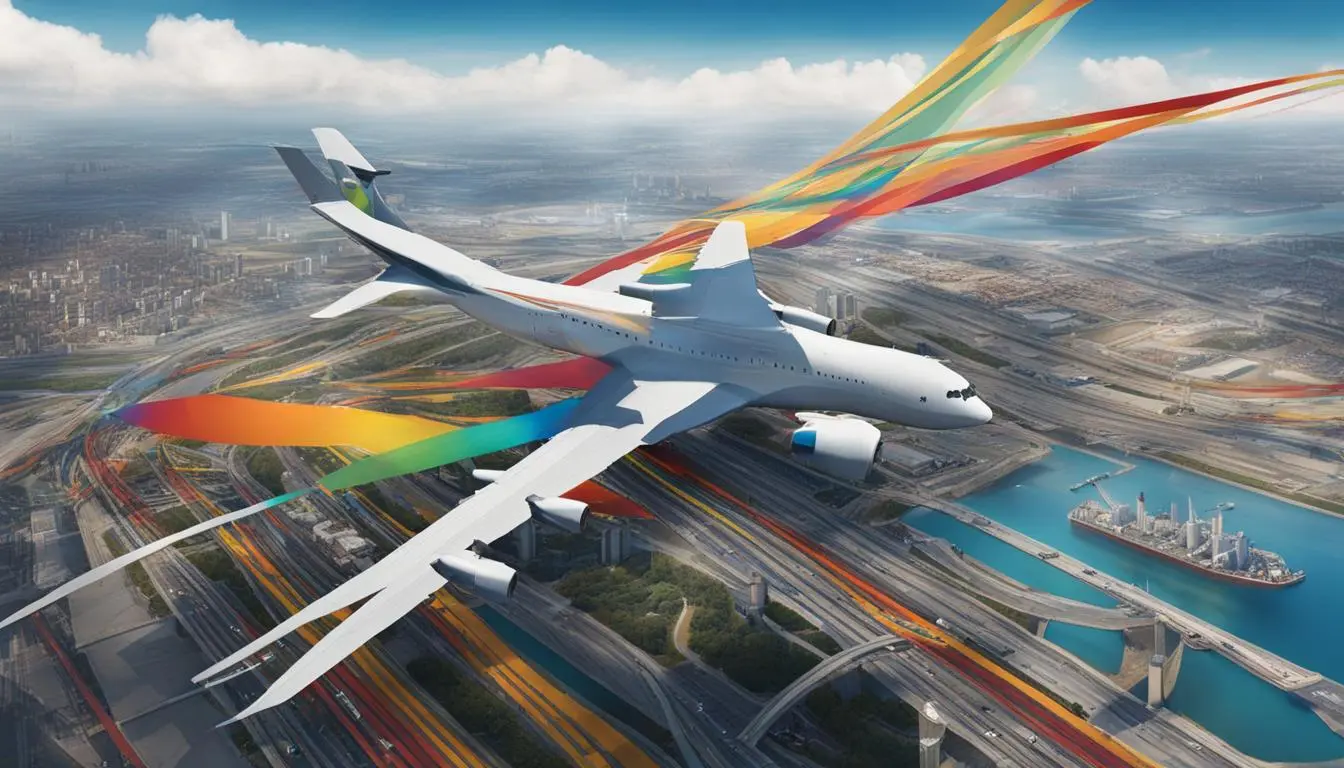The air cargo industry is undergoing significant growth, with global demand increasing by 6.9% compared to pre-COVID levels. To maximize revenue and market reach, airlines can forge strategic alliances with freight forwarders, diversifying cargo offerings and expanding their customer base. By collaborating with freight forwarders, airlines can explore innovative cargo solutions, expand their network, and optimize cargo space utilization. The collaboration platform provided by Unisys Cargo Portal Services™ enables seamless communication, booking, and execution of cargo shipments, resulting in higher revenue and reduced administrative overhead for both airlines and freight forwarders.
Key Takeaways:
- Strategic air cargo partnerships offer opportunities for revenue maximization and efficiency improvement.
- Air freight alliances and logistics collaborations can help airlines diversify their cargo offerings and expand their customer base.
- Collaborating with freight forwarders allows airlines to explore innovative cargo solutions and optimize cargo space utilization.
- Efficient cargo networks and global shipping alliances facilitate seamless communication, booking, and execution of cargo shipments.
- Collaborative supply chain solutions, such as those provided by Unisys Cargo Portal Services™, contribute to higher revenue and reduced administrative overhead.
The Profitability of the Air Cargo Industry
In 2021, the air cargo industry generated $155 billion in revenue, marking a significant 20% increase from the previous year and a remarkable 53% increase compared to 2019. This surge in profitability can be attributed to the growing market demand for air cargo, which has seen a substantial 6.9% increase compared to pre-COVID levels. The reliance on global supply chains and the rise of e-commerce have further fueled this upward trend, propelling the air cargo industry to new heights.
Operational efficiency is another crucial factor driving profitability in the industry. Airlines that prioritize efficient operations benefit from lower costs, quicker turnaround times, and increased customer satisfaction. By streamlining processes and optimizing resource allocation, airlines can maximize their revenue potential and capitalize on the growing demand for air cargo services.
As the global market continues to evolve, airlines that focus on enhancing their operational efficiency and meeting the demand for air cargo services will be well-positioned to achieve sustained profitability and success.
The Power of Collaboration with Freight Forwarders
Collaborating with freight forwarders offers airlines significant growth and increased profitability. By working together, freight forwarders and airlines can explore new cargo solutions, diversify service offerings, and cater to niche markets. Strategic alliances also provide access to an extensive network of global agents and partners, allowing airlines to expand their reach and offer cargo services to a broader customer base.
Moreover, by diversifying sales channels and expanding freight forwarder reach, airlines can optimize cargo utilization, maximizing flight space and ensuring consistent revenue regardless of passenger demand fluctuations. This seamless network expansion enables airlines to efficiently tap into new markets, leverage expertise, and capitalize on the forwarder’s established customer base. Through this collaboration, airlines can enhance their operational efficiency and achieve higher revenue streams.
“Collaboration with freight forwarders opens doors to innovation and service diversification. It enables airlines to tap into the knowledge and experience of freight forwarders, who play a crucial role in creating seamless supply chains and optimizing cargo utilization,” says industry expert, Sarah Thompson.
Streamlined Processes and Efficiency
The collaboration between airlines and freight forwarders streamlines processes and enhances efficiency throughout the supply chain. By leveraging the expertise and resources of freight forwarders, airlines can optimize cargo space utilization, reduce costs, and ensure timely delivery of goods. This partnership allows for better coordination in terms of scheduling, warehousing, and transportation, enabling smooth operations and minimizing disruptions.
Furthermore, collaborating with freight forwarders provides airlines with valuable insights into customer demands and market trends. By gaining a deeper understanding of customer needs, airlines can tailor their services and offerings to meet specific requirements, creating a competitive advantage in the market. This collaborative approach fosters innovation and facilitates the development of new solutions that address emerging challenges and opportunities in the air cargo industry.
| Benefits of Collaboration with Freight Forwarders | Key Advantages |
|---|---|
| Innovation and Service Diversification | Expanding service offerings and finding new cargo solutions |
| Seamless Network Expansion | Access to a global network of agents and partners |
| Optimized Cargo Utilization | Maximizing flight space and consistent revenue |
| Streamlined Processes and Efficiency | Improved coordination, reduced costs, and timely delivery |
| Insights into Customer Demands | Customizing services and meeting specific requirements |
Optimizing Processes with Next-Gen Technology
Airlines in the air cargo industry can gain a competitive edge by embracing next-generation technologies to optimize their processes. The use of artificial intelligence (AI) is revolutionizing the industry by enabling airlines to make data-driven decisions, optimize routes, and increase operational efficiency. By leveraging AI algorithms and machine learning capabilities, airlines can analyze vast amounts of data to identify patterns, predict demand trends, and optimize cargo capacity utilization.
Advanced analytics plays a crucial role in enhancing decision-making capabilities beyond traditional analytics. With sophisticated tools, airlines can gain deep insights into market trends, customer behavior, and operational performance. By harnessing the power of advanced analytics, airlines can make informed decisions, identify areas for improvement, and enhance their overall operational efficiency.
Quantum computing, an emerging field, has the potential to revolutionize the air cargo industry. With its ability to process vast amounts of data and optimize complex logistical problems in seconds, quantum computing can significantly enhance operational efficiency and output. Airlines can leverage this technology to improve route optimization, fuel consumption, and overall supply chain management, leading to cost savings and increased revenue.
To summarize, the adoption of next-generation technologies like artificial intelligence, advanced analytics, and quantum computing offers immense opportunities for airlines in the air cargo industry. These technologies enable airlines to optimize their processes, make data-driven decisions, and enhance their operational efficiency. By embracing these technological advancements, airlines can stay ahead of the competition and maximize their revenue and capacity.
| Technology | Benefits |
|---|---|
| Artificial Intelligence (AI) | – Data-driven decision-making |
| – Optimized route planning | |
| – Increased operational efficiency | |
| Advanced Analytics | – Deep insights into market trends and customer behavior |
| – Enhanced decision-making capabilities | |
| Quantum Computing | – Optimized complex logistical problems in seconds |
| – Improved route optimization and fuel consumption | |
| – Cost savings and increased revenue |
Embracing Sustainable Solutions in Air Freight
The air freight industry is recognizing the importance of sustainability and actively incorporating practices that reduce its carbon footprint. By adopting sustainable practices, airlines can contribute to the global effort to combat climate change while enhancing their reputation as responsible corporate citizens.
One key initiative in air freight sustainability is carbon offsetting. Carbon offset programs allow customers to offset their emissions by investing in projects that reduce greenhouse gas emissions elsewhere. This not only helps mitigate the environmental impact of air freight but also provides customers with a tangible way to contribute to sustainability efforts.
Carbon offsetting programs enable our customers to take direct action in reducing their carbon footprint and demonstrate their commitment to sustainability.
Another aspect of sustainability in air freight is the exploration of alternative fuels. Airlines are actively researching and adopting alternative fuel sources, such as biofuels, which have a lower carbon footprint compared to traditional jet fuels. This transition to alternative fuels not only reduces greenhouse gas emissions but also helps decrease the industry’s dependence on fossil fuels.
The Benefits of Sustainable Practices in Air Freight
Embracing sustainable practices in air freight brings numerous benefits to both the industry and the environment. By reducing carbon emissions through carbon offsetting and the use of alternative fuels, the air freight industry can make significant progress in achieving its sustainability goals. This not only helps protect the environment but also ensures the long-term viability of the industry by aligning it with global sustainable development objectives.
Furthermore, adopting sustainable practices can help airlines and freight forwarders differentiate themselves in an increasingly environmentally conscious market. Customers are increasingly prioritizing sustainability when making purchasing decisions, and companies that can demonstrate their commitment to sustainable practices have a competitive advantage.
| Sustainable Practices in Air Freight | Benefits |
|---|---|
| Carbon offsetting programs | Reduces carbon footprint, demonstrates commitment to sustainability |
| Alternative fuels (biofuels) | Reduces carbon emissions, decreases dependence on fossil fuels |
Overall, embracing sustainable solutions in air freight is not only an ethical imperative but also a strategic move that can drive business growth, enhance customer loyalty, and contribute to a cleaner and more sustainable future.
Conclusion
As the global air cargo industry undergoes significant transformation, strategic air cargo partnerships play a vital role in maximizing revenue and efficiency. By forging alliances with freight forwarders, airlines can diversify cargo offerings, expand their network, and optimize cargo utilization, leading to increased profitability.
Emerging technologies such as AI, advanced analytics, and quantum computing offer opportunities for process optimization and revenue maximization. By harnessing the power of artificial intelligence, airlines can make data-driven decisions, optimize routes, and increase operational efficiency. Advanced analytics goes beyond traditional methods, using sophisticated tools to predict future trends and behaviors, enabling airlines to stay ahead of the competition.
Additionally, embracing sustainable practices is essential for the air cargo industry. Carbon offsetting programs allow customers to mitigate their emissions and contribute to projects that reduce greenhouse gases, demonstrating a commitment to environmental responsibility. Airlines are exploring alternative fuels, such as biofuels, to lower their carbon footprint, contributing to a greener future.
To stay competitive and thrive in the evolving industry landscape, businesses and individuals involved in air cargo transportation must adapt to these trends and innovations. By embracing strategic partnerships, leveraging emerging technologies, and adopting sustainable practices, the air cargo industry can continue to meet the demands of global trade while minimizing its environmental impact.
- Customer Engagement and Loyalty: Innovating the Future of Saudi Arabia’s Dedicated Cargo Airline - December 23, 2024
- Regulatory and Compliance: Pioneering the Future of Saudi Arabia’s Dedicated Cargo Airline - December 21, 2024
- Financial Strategies: Fueling the Growth of Saudi Arabia’s Dedicated Cargo Airline - December 20, 2024






